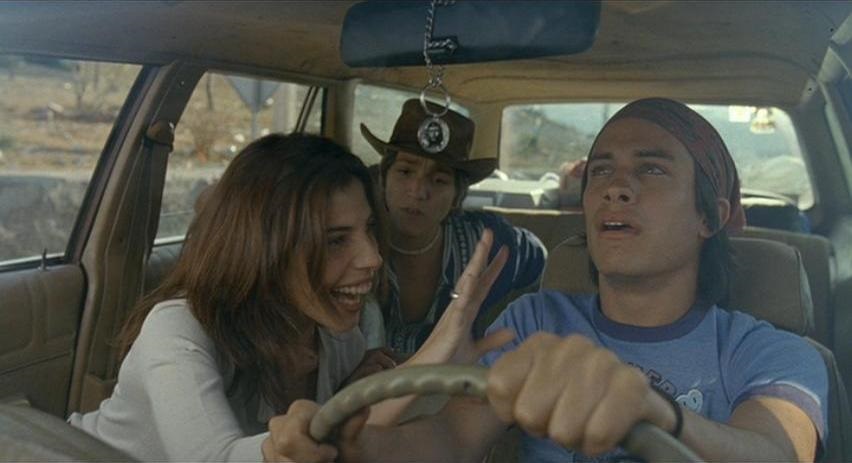Y Tu Mamá También is a lovely road trip movie in which Alfonso Cuarón provides a beautiful travelogue of Mexico. As the travel signals the journey all the characters go through, remote and endless beaches captured artfully by cinematographer Emmanuel Lubezki liberate them morally as well as sexually, and allow them to breath freely.
Julio (Gael García Bernal) and Tenoch (Diego Luna) are two teenage boys living in Mexico City, seeking sexual experience after their girlfriends go abroad for the summer. The boys seem to have a very close friendship despite the conflict between their fathers’ political stands. The two know each other so well, and barely set any boundaries- which in the end leads them to be almost as one; as is affirmed in the voice over at the beginning of the film. Along the travel, as the two set each other free, older and charming Luisa (Maribel Verdú) welcomes eternal freedom.
At first, the film looks like it is obsessed with sex, but actually it is obsessed with death.

Sex is for sure a main theme in the film as sexuality plays a major role in maturation and coming of age, as well as in the boys’ friendship. In addition to having sex with each other’s girlfriends, they masturbate beside one another and comment on the attractiveness of each other’s penis. The scene where Tenoch’s father tucks his shirt in before he tweaks his cheek signals a patriarchal domination over the boy’s penis; which for me was a clear message of his need to gain sovereignty of his own sexuality. Whereas sex is an adventurous discovery for the boys, Luisa uses it as an escape as well as a celebration of her carefree final joys.
In fact, there are two storylines here; two deaths. One is obviously Luisa’s impending death that is inevitable in the near future, which we don’t find out until the very end. She is heartbroken when her husband admits his affair, which she already knew about but avoided to confront, and the first thing she says is “Why are you telling me this?”. After that point, she decides to confront death as well.
The film tells stories of many deaths throughout the film; the story of a construction worker whose death causes a traffic jam, of Luisa’s first boyfriend who died in a motorcycle accident when he was 17, the same age as the boys. What we eventually watch is the story of two teenagers who are eager to experience life without the smallest thought of death, and of Luisa who has the “carpe diem” spirit at her final remaining days and embraces life together with death. She teaches a little girl how to float in the sea “like a real dead body.” This is not a premature grief, this is a liberation. As she advices: “Life is like foam, so give yourself away like the sea.”
The second death is of the boys’ friendship which exceeds any limits throughout this liberation journey and dies after reaching its climax when the sexual tension is as well broken. The plot, in my opinion, is very realistic. Luisa, who is so full of life (because she is full of death), shows the boys how to float in life. As charming as it sounds, it is not feasible in the ordinary course of their life. They are naturally estranged, but open at the same time when “It was easier to go to a cafe rather than coming up with an excuse.”

Y Tu Mamá También is beautiful both in narrative and cinematography. The political unrest is visible in the details in every scene, juxtaposed with the everyday Mexican life; police on duty, the beggars, the wedding cars… There is repetitive use of point-of-view shots which places the viewer inside the car to see and experience them with the characters. The film highlights its realness when the political is very personal, and what’s comedic is highly tragic. The presence of a voice over not only renders the film as a tale, but also gives social analysis, political insight, and details on the past and the future about the characters which makes them deeper and layered.
If you enjoyed watching Y Tu Mamá También, I would like to recommend you to see The Dreamers as well.
